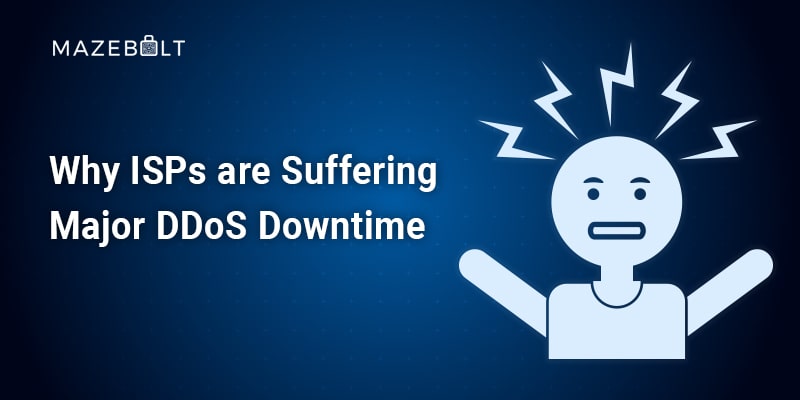DDoS Attacks on ISPs?
Internet Service Providers are top targets for DDoS attacks because a network shutdown directly impacts customers who use the services daily. That’s why DDoS attackers’ main goal is to render ISP services inaccessible for a prolonged period. For ISPs, the longer the DDoS mitigation solution takes to act, the higher the disruption and damage. On account of this, attackers prefer to target bigger ISPs because it disrupts the country’s government, scientific and academic infrastructure. However, smaller ISPs are equally lucrative targets because they have less bandwidth, limited DDoS protection, are more vulnerable, and can be easily attacked.
In light of recent events, DDoS attackers targeted Belgium’s largest ISP provider and several smaller ISP providers in Ireland. Both events adversely affected the user experience, and victims suffered from severe business damage.
Belnet, the government-funded Internet Service Provider for Belgium’s educational institutions, research centers, scientific institutes, and government services, is a recent victim of a damaging DDoS attack that took down the websites of more than 200 organizations across the country. Brussels Times reports that the attack is still ongoing.
Dirk Haex, technical director at Belnet, quotes, “The fact that the perpetrators of the attack constantly changed tactics made it even more difficult to neutralize it.”
In another incident, many Irish internet service providers were knocked off by DDoS attackers demanding Bitcoin payments as ransom. A leading Irish newspaper mentions that the victims are aware of ongoing DDoS attacks and ransom demands but are hesitant to publicly address the issue, fearing it can conflate with the ransomware attacks currently crippling the Health Service Executive (HSE) services.
Eileen Gallagher, the interim CEO of the Internet Neutral Exchange Association, confirms, “In the past week, a number of internet service provider networks, of varying sizes, have been intermittently targeted with DDoS attacks in Ireland.”
Why Companies cannot block DDoS attacks?
-
-
- Despite deploying the top mitigation systems damaging, DDoS attacks are still bringing down systems! Mitigation solutions are well designed to stop DDoS attacks but require manual configuration, which usually happens only after the attack is launched and not before. In addition, attacks are now smarter, quicker, and more complicated to identify and stop.
- A deployed mitigation solution is configured to block identified vectors, but it lacks automatic real-time reconfiguration capabilities to block new DDoS vector variants. As a result, the inefficiency of mitigation solutions increases the DDoS vulnerability gap, and attacks successfully bypass it causing damaging downtime. So many companies suffer major downtime from DDoS attacks because their DDoS posture is incomplete.
-
What organizations need is real-time visibility of their networks to close the vulnerabilities before attackers can exploit them. However, many times, organizations do not have insights on vulnerability points that are susceptible to a potential DDoS attack. Therefore, they are likely to be unprepared to block the attacks.
Block all ISP DDoS attacks with RADAR Testing™.
RADAR™ testing, MazeBolt’s transformative technology, is the only 24/7 automatic DDoS attack simulator on live environments with ZERO downtime/disruption. Mitigation solutions are more effective when deployed with RADAR™. RADAR™, compatible with all mitigation solutions, automatically detects, analyzes, and prioritizes the remediation of DDoS vulnerabilities across the network.
Take ISP DDoS Protection to the Next Level!
-
-
- The MazeBolt team evaluates an organization’s readiness to block DDoS attacks. RADAR™ testing provides an ongoing analysis of surface risks and requires no maintenance windows.
- RADAR™ testing provides security teams with valuable analysis to find the missing brick in the deployed DDoS mitigation solution so they can fix it before an attack and not after.
- RADAR™ testing offers a provision for organizations to re-validate remediation without creating downtime. Revalidation ensures that the deployed mitigation solution can block DDoS attacks under the most challenging threat conditions.
- Organizations no longer have to rely on the limited visibility of the network. Instead, they can fine-tune their mitigation policies regularly against surface risks detected in real-time and prevent successful DDoS attacks.
-
By adding RADAR™ testing, organizations will increase the efficiency of deployed mitigation solutions by performing continuous simulations, detecting real-time vulnerabilities, reconfiguring their policies, and re-validating remediation, all with no downtime, thereby ensuring smooth business continuity.
Connect with our team to learn more about the solution.


